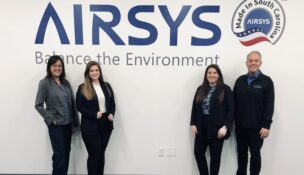Soft skills a key indicator for employee retention
Staff //October 1, 2021//
 By Teri Errico Griffis
By Teri Errico Griffis
Dillon Lesniewski majored in history at Clemson University. He never expected his education to transfer to a successful career at a tech company, but after nearly five years of promotions, he is now a product owner at BoomTown, a software company in Charleston.
Lesniewski said people often judged his course of study, assuming he’d work at a museum or something artistic and unstable. But history is an underrated major, he said. During his four undergraduate years, he researched, wrote, debated and questioned in ways that translated well into the professional world.
So what if he didn’t know the technology? Lesniewski knew he had the skillset to learn it, and that is what set him above the rest of the candidate pool — even those with relevant occupational skills.
“People try to make a big deal that I didn’t study software, that I can’t code a website or build an API, but I don’t need to know everything,” Lesniewski said. “I just need to know what brings me to the table and recognize my own strengths, like interpersonal skills, patience and empathy. Those are what earned my seat there.”
More and more, workforce experts are finding that soft skills have become critical indicators of individuals who can not only attain employment, but retain it.
Technology companies like BoomTown and Blackbaud on Daniel Island know occupational skills can be taught, but flexibility, problem solving and whether an employee brings kindness and passion to their daily role cannot, said Stephanie Walker, Blackbaud’s vice president of talent acquisition
“Organizations have grown to recognize that soft skills and higher emotional intelligence lead to greater success,” Walker said. “It’s not just about completing the task.”
Blackbaud Senior Director, Leadership and Culture Monica Mutter said the focus starts in the interview and whether the candidate can tell a story.
“We ask candidates to describe how they’ve handled different situations in the past and to share more about themselves and their interest,” Mutter said. “We look at how they articulate that. It’s our chance to get to know the candidate beyond the resume.”
Regardless of the candidate’s background, Walker listens for whether someone is passionate about helping customers or not, if they’re creative and work well with teammates or if they’re goal-oriented.
“These types of soft skills are paramount to ensuring that the candidate is a good match for Blackbaud, and vice versa, that Blackbaud is a good match for the candidate,” she said.
Prior to his product owner role, Lesniewski worked in BoomTown’s customer service department and eventually became a team lead, hiring often for the constantly rotating team. He ascribed to the same process of candidate evaluation.
“If conversation flowed easily, whether a person was talking about their life or their skills, I knew that would translate to someone who could hold a conversation well with clients,” he said.
Of a pair of candidates Lesniewski hired, one came from a strong customer support background, but lacked interpersonal skills, while the other transitioned from food and beverage but was extremely congenial. The team expected the candidate with hard skills to flourish, but instead, she quit within a year. The food and beverage worker has since thrived and has become a respectable member of the company. He is still with BoomTown three years later.
Never underestimate the power of a conversation, Lesniewski said. Even when he’s talking to someone in the hallway about their dog or weekend plans, it’s work. He’s building personal connections with coworkers. Those relationships not only make his work life more meaningful, but they create a support system when he needs help. Now he’s no longer a random name in an email, but someone trustworthy. The same goes for conversations with clients.
“The things that I bring to the table, others don’t, and it’s important to recognize what you’re there for, versus what others are there for,” Lesniewski said. “I can put myself in the shoes of a 65-year-old real estate agent way better than our developers can. I know how to make a decision and how clients will react.”
After years of pushing occupational training, and with 97,000 vacant positions statewide, South Carolina, too, is shifting its focus more equally toward soft skills.
This summer, the S.C. Department of Employment and Workforce started a certification program to recognize six essential soft skills in the workforce: communication, digital literacy, problem solving, professionalism, teamwork and time management.
Workers can self-lead or attend an instructional training to earn the S.C. Essential Soft Skills Certificate, said Michelle Paczynski, assistant executive director for SCDEW. Unlike other classes that people can attend and check off as completed, with the Essential Soft Skills training, attendees are assessed and must score at a specific level to earn the certificate, which companies throughout the state are starting to recognize.
“In a place where many companies still don’t know a year from now where they will be and how they are going to operate, soft skills have become front and center for a candidate to be considered for employment opportunities,” Paczynski said. “To us, soft skills are the behavioral skills that are transferrable to most positions and are indicators of whether a candidate could succeed with a company.”
The pandemic has changed the workforce landscape indefinitely, and virtual and hybrid workers must be able to adapt to ever-changing operating procedures.
“At Boomtown, we had a successful employee come from a fashion background. The previous support manager was an art history major,” Lesniewski said. “I don’t think what makes someone good is where they came from, but rather who they are as a person.”
i














